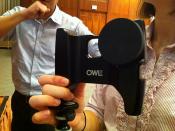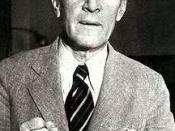Stephanie
Ms. Ogarek
Muckraking v. Fiction
Webster's dicctionary defines muckraking as, "To search out and publicly expose real or apparent misconduct of a prominent individual or business." Fiction, also defined by Webster, is, "Something invented by the imagination or feigned; specifically: an invented story." Throughout The Jungle more fact is used than fiction. The Jungle is more effective as a muckraking novel than it is as fiction.
The Jungle shows the disgusting conditions of the stockyards. It let the reader see that the revolting rotten meat was packaged and sold to consumers throughout the country but by regulation only the worst quality and most diseased was sold in Chicago. "'Devyled Ham' was made out of the waste ends of smoked beef that were to small to be sliced by the machines, and also, trip, dyed with chemicals so that it would not show white, and trimmings of hams and corned beef; and potatoes, skins and all; and finally the hard cartilaginous gullets of beef, after the tongues had been cut out."
(111) Food was discussed in this manner throughout the novel. The American public was outraged by the unsanitary way their food was handled and packaged. Thus the novel succeeded in muckraking this social subject.
The Jungle not only portrayed the disgusting food but the horrifying working conditions as well. "Let a man so much as scrape his finger pushing a truck in the pickle-rooms, and he might have a sore that would put him out of the world, all the joints in his fingers might be eaten by the acid, one by one" (112). The following example is during the winter time, "The men would tie up their feet in newspapers, and old sacks and these would be soaked in blood and frozen, and then soaked again, and so...


